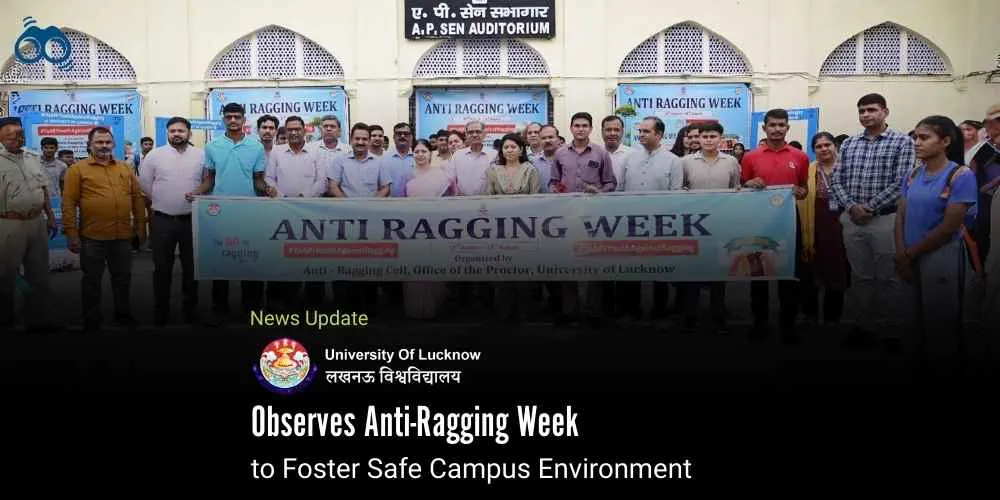Anti-Ragging Week Highlights Legal Safeguards and Institutional Accountability
UGC-Guided Campaign Reinforces Student Welfare at Lucknow University
Ragging remains a serious concern across Indian campuses, with over 3,100 complaints registered at the National Anti-Ragging Helpline between 2022 and 2024, according to the Society Against Violence in Education (SAVE). Notably, medical colleges alone accounted for nearly 39% of all cases and over 45% of ragging-related deaths during this period. In response to these alarming trends, and following the guidelines issued by the University Grants Commission (UGC), universities across the country have intensified efforts to strengthen student welfare policies. As part of this broader national initiative, Lucknow University observed Anti-Ragging Week from 12th to 18th August 2025. The campaign, spearheaded by the Anti-Ragging Cell under the Office of the Proctor, was designed to foster a safe, inclusive, and respectful academic environment for all students.
Throughout the week-long campaign, the university hosted a series of safety-focused initiatives, including lectures by legal experts, counsellors, and faculty members. These sessions not only highlighted the legal framework surrounding campus safety but also explained the anti-ragging law in India and outlined penalties under the Indian Penal Code (IPC) for offences such as wrongful restraint (Section 339), criminal intimidation (Section 506), and physical harm (Section 323).
In addition, the sessions referenced the Bharatiya Nyaya Sanhita (BNS) Bill 2023, which is set to replace the IPC, thereby signalling a shift in how student-related offences may be codified in future legal frameworks. Students were informed that ragging constitutes not only a disciplinary violation but also a punishable offence under multiple legal provisions. Accordingly, the campaign emphasised anonymous reporting mechanisms and direct escalation rights to police or courts, as mandated by the UGC Regulations 2009 and reinforced by Supreme Court directives. To encourage meaningful engagement, interactive activities such as poster-making competitions, street plays, and pledge ceremonies were organised. These creative platforms enabled students to reflect on the issue and express solidarity with affected peers. Real-life case studies were also shared to illustrate the psychological and social impact of ragging, thereby reinforcing the university’s zero-tolerance policy.
A short film produced by the Botany Department depicted the mental, social, and legal consequences of ragging, and was screened during departmental sessions led by Prof. Manuka Khanna and Prof. Gauri Saxena. Furthermore, anti-ragging awareness corners were set up across the campus, displaying helpline numbers, grievance redressal mechanisms, and contact details of the Anti-Ragging Committee and Squad. The National Anti-Ragging Helpline (1800-180-5522) and online portal (antiragging.in) were prominently featured to ensure students had immediate access to support.
The campaign drew active participation from the Vice-Chancellor, faculty, and student representatives, thereby reaffirming the university’s commitment to student welfare and legal compliance. The administration urged students to become active partners in eradicating ragging, report incidents promptly, and support peers in distress. In line with Supreme Court directives, the university also collected anti-ragging affidavits from students and parents, storing them in a centralised electronic database for monitoring and compliance. This initiative aligns with broader legal developments and court rulings on campus safety. In recent years, both the Lucknow High Court and the Supreme Court of India have issued strong directives to educational institutions, mandating the formation of anti-ragging committees, crisis hotlines, and monitoring cells.
For instance, the 2018 suo moto case titled Lucknow University v. State of U.P. saw the High Court intervene after expelled students attacked the Vice-Chancellor and faculty, leading to the indefinite closure of the university and disruption of admissions. The court emphasised institutional accountability and directed the police to ensure preventive measures were in place. Moreover, the Supreme Court’s landmark 2009 judgment, following the Raghavan Committee recommendations, mandated that every university must establish Anti-Ragging Committees, Squads, and Monitoring Cells, and enforce penalties for non-compliance. By observing Anti-Ragging Week, Lucknow University has demonstrated its alignment with national standards on education legal news, while reinforcing its role in promoting student welfare policies, legal literacy, and a culture of dignity and mutual respect.
This initiative also reflects compliance with the UGC’s 2016 Guidelines on Safety of Students on and off Campuses, which recommend biometric attendance, CCTV surveillance, and emergency notification systems to prevent violence and harassment. Furthermore, the Association of Indian Universities (AIU) has recently recommended integrating student welfare services, such as mental health counselling, peer mentoring, and legal literacy, into mainstream academic planning, a model Lucknow University is now actively adopting. Through this comprehensive campaign, the university has reaffirmed its commitment to safeguarding student rights and cultivating a campus culture rooted in safety, equity, and legal awareness.
Editor’s Note:
Ragging continues to pose a serious threat to student safety and well-being across many Indian universities. Despite legal safeguards and institutional policies, cases of harassment, intimidation, and violence persist, often leaving lasting psychological and academic consequences. It is therefore essential that universities take proactive steps to prevent such incidents and promote a culture of respect and accountability. Lucknow University’s observance of Anti-Ragging Week from 12th to 18th August 2025 reflects a strong commitment to student welfare and legal compliance. The initiative included awareness sessions, legal education, creative engagement, and direct support mechanisms. It also aligned with national guidelines issued by the University Grants Commission (UGC) and recent judicial directives aimed at strengthening campus safety.
Skoobuzz emphasises the need to inform students, parents, and educators about the legal and institutional measures in place to protect learners from ragging. It further stresses the role of collective responsibility in building safe and inclusive learning environments. Such efforts are crucial to ensuring that every student can pursue education without fear, discrimination, or harm.














0 Comments (Please Login To Continue)